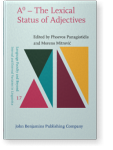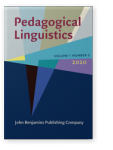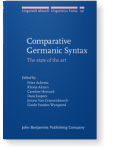Volker Struckmeier
List of John Benjamins publications for which Volker Struckmeier plays a role.
2022 Universal and language-specific aspects of adjectives: Absolute categories and relational molds A0 – The Lexical Status of Adjectives, Panagiotidis, Phoevos and Moreno Mitrović (eds.), pp. 15–72 | Chapter
This paper argues that categoriality is a multi-layer notion. Some properties of categoriality may be cross-linguistically universal. However, other properties of linguistic categorization differ between languages. Some of these properties can be described by (non-categorial) properties of… read more
2020 Why are there growing divisions between traditional grammars and theoretical and experimental linguistic works (and how can they be overcome)? Pedagogical Linguistics 1:2, pp. 211–233 | Article
The present article discusses a worrying development, whereby some traditional grammars become less aligned with the findings of linguistics research. The article gives examples of such discrepancies, illustrated here on the basis of the description of German. It also aims to describe a possible… read more
2014 On the properties of attributive phrases in Germanic (and beyond) Adjectives in Germanic and Romance, Sleeman, Petra, Freek Van de Velde and Harry Perridon (eds.), pp. 149–170 | Article
The syntactic structure of attributive constructions and their (corresponding) semantic integration into nominal projections is the subject of a long-standing debate. In this article, we focus on complex attributes in German, Dutch and Standard Arabic. We argue that adjectival, participial and… read more
2012 A morphologically guided matching approach to German(ic) relative constructions Comparative Germanic Syntax: The state of the art, Ackema, Peter, Rhona Alcorn, Caroline Heycock, Dany Jaspers, Jeroen van Craenenbroeck and Guido Vanden Wyngaerd (eds.), pp. 387–414 | Article
This article argues for a matching analysis of attributive constructions in German proposed by Struckmeier (2007): The suffixal morphology found on attributive adjectives and participles (traditionally called case, gender and number), and similar markers found on relative pronouns in German,… read more



